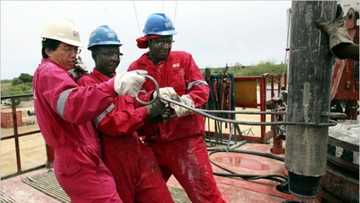Nigerians Shock as Govt Data Shows Northeast Region has Most Certified IT Professionals in the country
- The National Bureau of Statistics (NBS) has revealed the North-East of Nigeria has the most certified IT professionals
- According to the dataset, the geopolitical region has 25.90 percent of certified IT professionals.
- This puts it ahead of the other geopolitical zones of Nigeria with Nigerians questioning how this was arrived at
Many Nigerians have expressed surprise that the National Bureau of Statistics (NBS) named the North East region as the center for Information Technology experts.
This is despite the fact one of West Africa's major computer marketplaces is situated in Lagos (Ikeja, Alaba, and Yaba).
Nigerians are even more surprised given fact that the Northern part of the country has the lowest education literacy rate in the country.

Source: Original
IT professionals’ competency include the ability to conduct research, plan, and design, write, and test, provide advice and improve information technology systems, hardware, software, and related concepts for specific applications.
Do you have a groundbreaking story you would like us to publish? Please reach us through info@corp.legit.ng!
Breakdown
A breakdown of the report shows that out of a total of 23.4 million people surveyed; only 1.3 million are certified IT professionals. The 1.3 million youth who are certified IT professionals have specialized skills in areas like Artificial Intelligence(AL), database administration, graphics & design, multimedia, networking, software engineering, and web design & management.
A further breakdown of the 1.3 million shows that the North-east recorded the highest number of 326,704 (25.9 percent) followed by 306,041 (24.3 percent), 268,678 (21.3 percent), 127,120 (10.1 percent), 126,718 (10.1 percent), and 104,209 (8.3 percent) in South-South, North-West, South-East, North-Central, and South-West respectively.
Nigerians react
Kunle Ademola an IT expert said:
"I don't believe that information is correct. Although there are many young people in the North who are interested in ICT, the percentage of them is not even close to, or even a quarter of, the percentage of NBS figure."

Read also
Nigeria's unemployment figures worsen as report reveals list of 50 Companies to have shut down in 5yrs
Another Yemi Orimolade, the founder at Tellit.NG, a strategic communication technology-driven organization noted:
"Why, if the North-East area has the greatest proportion, aren't innovations being driven there? Where are the enablers, innovation hotspots, and co-creation zones?"
For Kassy Olisakwe, an AI enthusiast said.
“Most of the technology companies that bring their certifications to Nigeria bring it first to Lagos, and then Abuja and Port- Harcourt because those are where they have their branches. Apart from that, it is difficult to learn Al, or other specialized areas of IT except when you come to Lagos."
More reaction:
“If we want to be sincere and fair, how many Northern tech experts have been able to drive foreign investments through tech.”
Data collection method
The report, a collaborative effort between the Federal Ministry of Youth and Sports Development (FMYSD) and the NBS was surveyed across the six geo-political zones of the federation.

Read also
Full list: Names, ages of 11 Nigerians arrested, charged by US govt for N3.69bn fraud, they face up to 30 years in prison
Four replicates representing 40 Enumeration Areas (EAs) were selected in each of the reporting domains within the zone using a systematic sample selection procedure.
The selection of the ultimate sampling units – the households and the eligible respondents between the ages of 15-35 years were randomly and systematically carried out using the “Kish” Method of Sample selection (a way of randomly choosing household survey respondents).
However, 15 households were selected per EA. In each of the households, the “Kish” Sample selection method was adopted to select the eligible respondents within each household. A maximum of two eligible respondents was selected in each household.
World bank similar report
According to a recent Nigerian Digital Economy Diagnostic Report by the World Bank, the digital industry is concentrated in Lagos and Abuja, marking an important geographic and sectorial divide in the use of digital technologies.
The report further stated:
“Lagos is a mature and active ecosystem with dynamic incubators, venture capital companies, and digital start-ups. Digital entrepreneurship ecosystems are also growing in Abuja and Port Harcourt, with a potential for expansion to other cities."
Literacy level in the country
There has been a considerable educational development discrepancy between southern and northern Nigeria for many years.
According to NBS education data, the Northeast, Northwest, and North-central states have the greatest percentage of people who cannot read or write.
Meet talented Nigerian man who's building a computer made of brains
Legit.ng had earlier shared the story of a Nigerian man identified as Oshiorenoya Agabi presently extending the shores of things thought to be impossible with his ongoing project which involves the development of a computer with brains.
Agabi runs Koniku, the world’s first neurocomputation company, which operates between biotechnology and electronics.
The young man who resides in California wants to show the world through his company that computational power is an engineering problem.
Source: Legit.ng




